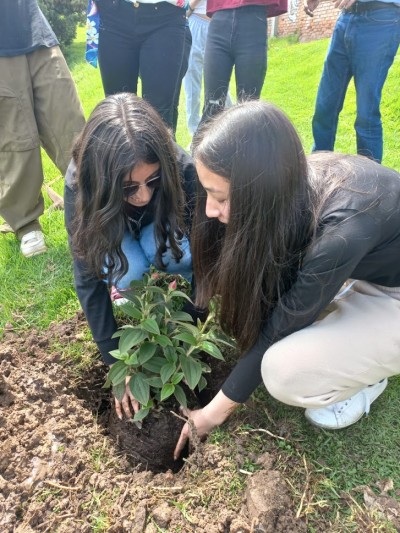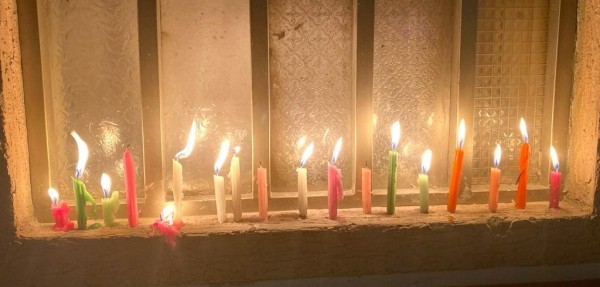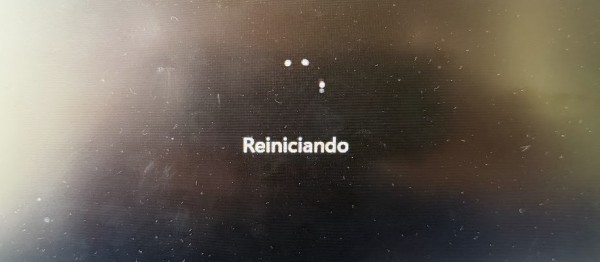
This Sunday we begin the season of Advent, and in the readings we will hear St. Paul telling us, “It is time for you to wake up from your slumber” (Rom 13:11), and Jesus reiterating the same message: “Stay awake!” (Mt 24:42).
With these two similar calls, we enter fully into the spirit of Advent. It is a time, then, to awaken, to be attentive, to scan the horizon and perceive in it the signs of God’s presence, which is coming and will be born to us at Christmas. Advent is also a time to identify the breaches that Jesus mentions in the same passage: cracks through which our good intentions, our desire to be good people and to live according to the Gospel, can slip away.
In these times, in which we live immersed in the digital revolution, perhaps an analogy with technology can help to illustrate what this season of Advent is all about. We know that every now and then we must restart a computer or a phone. We reset them or reboot them. Sometimes we humans also need a reset, and Advent gives us the opportunity to do so.
We restart our computers because something isn’t working properly: some harmful habit persists in the system, an error that has remained, causing problems, and that needs to be fixed. And we also restart our computers to access updates that are now available and that, once installed, will allow everything to work better.
To restart a computer, you have to turn it off. The same goes for us. Every now and then, we need to «shut down the system» in the sense of silencing the many noises that deafen us, that come from all sides and prevent us from thinking clearly. There is a lot of noise in politics, on social media, in television talk shows, and there is also noise that arises from within us in the form of old grudges and open wounds that we haven’t been able to heal. All this noise leads us to accumulate tensions, anxiety, resentments, bewilderment, and anguish.
In Advent, let’s begin by turning off the noise. One of the main characters of this season is John the Baptist, who went to the desert: that is, he distanced himself from the noise. From John, we can learn his choice to refuse to live amidst a whirlwind of activity, constantly absorbing information and noise, without time to process it. In the desert, John will offer a clear and new message because he has known how to distance himself from the noise—to then be able to think, and to understand what God wants from him.
And so, in Advent, after switching off the system, let’s restart it —with a different attitude. We can identify what was wrong within us before: what unhealthy habits were bothering us. Perhaps we had entered a cycle of negativity and pessimism. Perhaps we had started drinking too much or wasting time with other activities that brought us nothing positive. Perhaps we had begun to fuel a conflict with someone, to cultivate hatred, resentment, that kept growing. In Advent, we restart the system, our lives, from scratch, without those harmful habits.
And, in Advent, as we restart—as we awaken—we also seek new updates: we prepare to look at others with fresh eyes, to begin healthier habits. We watch for resources available to us, that until now we had not been using: people we should listen to a little more, readings that could enlighten us, acts of solidarity with the poor, which will strengthen our faith. Advent can be all of this: a true reset of the heart.
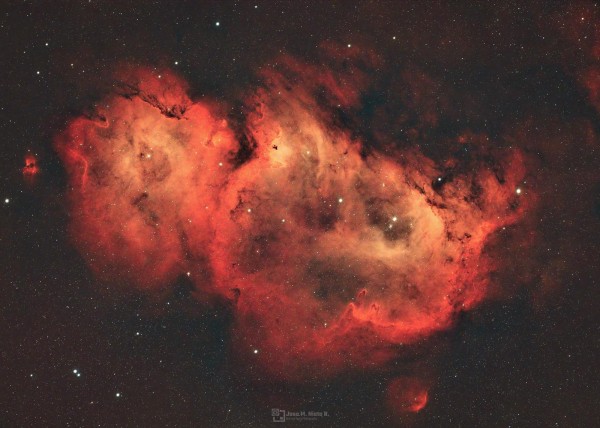
One of the “mottos” of Advent, one of the phrases that captures the spirit of this time that we began last Sunday, is “Come, Lord Jesus,” taken from the end of the Book of Revelation (Rev 22:20). It is, we could say, one of the most appropriate prayers of Advent.
And yet, it is important to make sure that we understand these words correctly. Because they are not a request, nor a demand that we address to Jesus so that he decides to come to us, as if he, for some reason, was hesitant and we had to convince him to actually come to the world.
“Come, Lord Jesus” is a request addressed to ourselves: a prayer in which we ask to gather the wisdom and the strength to open the doors of our lives to him and remove all the obstacles that we sometimes put in the way, blocking his way. Obstacles that we put because, in reality, we are afraid of his coming.
And why, we should ask ourselves, are we afraid of Jesus? Why do we resist Jesus' coming (even if we keep repeating "Come, come...")?
One possible answer is that we know, or we sense, that in one way or another Jesus always comes to unsettle us. He comes to give us a little push, to urge us to go further in our generosity, to abandon the routines that numb our conscience, and to make an exodus, outside the comfort that binds us and the territories that we already know, towards the risky life of the Gospel. That is why deep down, perhaps unconsciously, we fear Jesus' coming.
It would be good to identify the attitudes that tend to tie us into a desperate search for comfort. Review them, understand that they impoverish us and reject them. Then we will be able to say with all sincerity and vigor, in this Advent and always: "COME, LORD JESUS!"
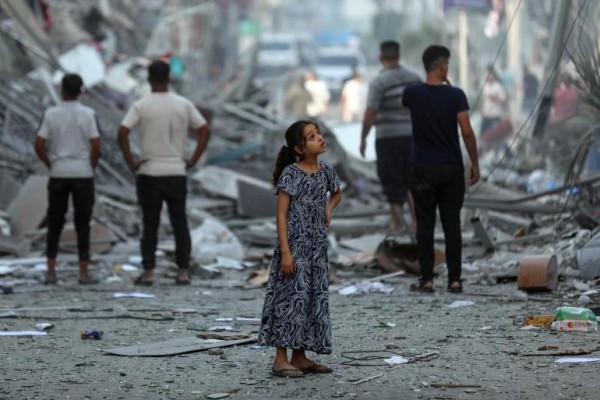
Isaiah is somehow the prophet of Advent. His texts (which, despite having been written twenty-eight centuries ago, can move us as if they had been composed yesterday) are especially present in the Eucharists of this time of preparation for Christmas. It is quite logical: as we prepare to celebrate the birth of the Prince of Peace in Bethlehem, we read the poet of Israel who most ardently dreamed about peace. Some of his most immortal and well-known pages are, in fact, beautiful songs against war and in favor of non-violence: «They shall beat their swords into plowshares, and their spears into pruninghooks: nation shall not lift up sword against nation, neither shall they learn war any more» (Is 2:4)1. Or this passage, justly famous, which does not cease to amaze us in spite of being so well known: «The wolf will live with the lamb, the leopard will lie down with the goat, the calf and the lion and the yearling together; and a little child will lead them. The cow will feed with the bear, their young will lie down together, and the lion will eat straw like the ox. The infant will play near the cobra’s den, and the young child will put its hand into the viper’s nest. They will neither harm nor destroy on all my holy mountain, for the earth will be filled with the knowledge of the Lord as the waters cover the sea.» (Is 11:6-9).
In this Advent of 2023, Isaiah's dream of peace seems very distant, even more distant and unattainable than a few years ago. The world, according to analysts, is becoming a more violent place, if we compare it with the scenario we had just at the beginning of the century. Apart from dozens of minor struggles (which, even though they are minor, cause countless victims), there are large-scale armed conflicts in Burkina Faso, in Somalia, in Sudan, in Yemen, in Myanmar, in Nigeria and in Syria... apart , obviously, of the war in Ukraine, in the heart of Europe (which will be two years old in February 2024, with hundreds of thousands of soldiers and more than 10,000 civilians killed to date) and the war between Israel and Hamas, which already accumulates nearly 20,000 fatalities. The Gaza Strip, paradoxically, is located less than sixty miles from Bethlehem, the birthplace of the Prince of Peace.
What to do, given this scenario? Should we forget forever about Isaiah and his dreams? Shall we surrender to the conviction that humanity will never be able to eradicate war? Must we understand that, as long as there are immense economic interests related to the arms industry, plows will never be forged from swords? It is a tempting position. The facts seem to support it.
The alternative is, of course, to argue that Isaiah's pacifist dream is a better path. To affirm that, in the face of the current return to war that we are experiencing, Isaiah, as well as the Gospel of Jesus (who will affirm that those who work for peace are blessed) are more necessary than ever. The alternative is to work so that these wars, today, are the last expressions of an ancient humanity, which one day will disappear, to give way to a new humanity, attached to peace, faithful to the visions of Isaiah and Jesus.
Each of us, with our daily attitudes —opting for non-violent ways to resolve the small conflicts in which we find ourselves, betting on dialogue and promoting justice— can work so that this new humanity is not an illusion. In Advent, in this Advent, it would not be a bad idea to redouble our commitment to peace. In the end, let us not doubt it, Isaiah will be right.
(1) This phrase, as is well known, is carved on a wall at the United Nations headquarters in New York.
Youth from La Resurrección Parish in Bogotá planting a tree near their church
The readings for the Sundays of Advent, especially those from the prophet Isaiah, underscore the importance of dreaming. They remind us that the ability to imagine a better future, a tomorrow in which today's problems are left behind, is essential. Isaiah dreams, and he dreams big; he dreams without limits. He dreams that one day, swords will be forged into plowshares and spears into pruning hooks, and that no one will train for war anymore. He dreams of a world without violence in which the strong will no longer destroy the weak, in which wolf and lamb, leopard and kid, lion and calf will live together without attacking each other. He dreams of a blossoming desert, where the blind will regain their sight, the deaf will hear, and the lame will leap like deer. Someone, without a doubt, could brand Isaiah as naive, crazy, deluded, and reproach him for living in an unreal world. He would surely reply that the only fools are those who do not dream. And that it is always better to hope for too much than to lock oneself in the resignation of those who assume that the problems of the present have no solution.
The prophets dream. Jesus also dreams. In his case, in a kingdom of brotherhood and justice (the kingdom of God is Jesus’ big dream), a kingdom of free people, of new men and women, in which even the smallest will be greater than John the Baptist (and «among those born of women there has been none greater than John the Baptist»).
Advent reminds us that if we don’t have dreams left, we don’t have anything.
And it is good to remember that everything (that is, everything good) starts with a dream. A family, a friendship, a project, a community... it all starts with someone entertaining an idea (which at the time may seem crazy) and telling themselves that it is worth working to make it a reality. «The struggle will be long. Let’s start right now» used to say Camilo Torres. And to start is to start dreaming. Many good things that today we take for granted and consider very normal, one day they were not. Furthermore, for the majority they were chimeras. Today they are a reality because someone dared to dream about them, and dared to think that they were possible. Someone, one day, imagined a world without slaves. Or a world without dictators, in which every four years the people would vote for their rulers. Someone dreamed of a world in which women had the same rights as men. A world where workers had a humane working day and a decent wage. A world in which the color of our skin no longer mattered.
There is still a long way to go («the struggle will be long...»). Yet, the fact that today millions of people live in countries without slavery, with democracy, in which women and workers can claim their rights and in which racism is condemned, is because someone, one day, dreamed of these achievements.
Advent is a time for those who stopped dreaming to do so again, and a time for us to consider which deserts in our lives should be flourish again.
One of the messages of this time of preparation for Christmas is, without a doubt, that we should not be afraid of dreaming in a better future. And if then someone accuses us of being dreamers, in the negative sense that we sometimes give to the term, let us remember that in reality the only fool is the one who no longer dreams.
There is no Christmas without Advent
There can be Advent without Christmas
Advent is necessary, but not enough
We need Christmas.
John the Baptist is necessary but not enough,
we need Jesus.
Mary is necessary but not enough,
we need her Son.
Repentance is necessary but not enough,
we need hope.
Prayers are necessary but not enough,
we need commitment.
Love of God is necessary but not enough,
we need our neighbors.
Love is necessary but not enough,
we need deeds.
Life is necessary but not enough,
we need dignity.
Unity is necessary but not enough,
we need solidarity.
Peace is necessary but not enough,
we need justice.
Tolerance is necessary but not enough,
we need communion.
The law is necessary but not enough,
we need mercy.
Words are necessary but not enough,
we need actions.
Respect is necessary, but not enough,
we need kindness.
Family is necessary, but not enough,
we need a village.
Yes, Advent is necessary, but we still need Christmas.
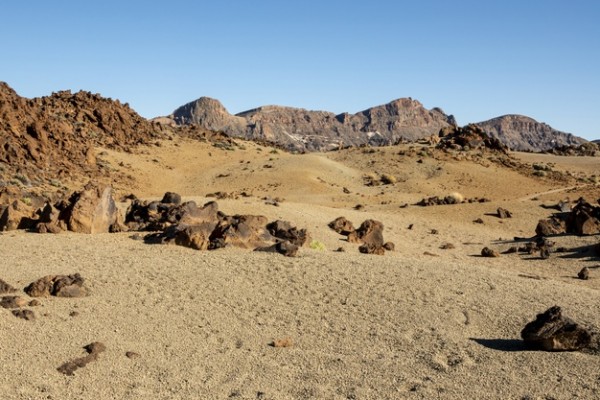
We are beginning Advent, these weeks of preparation for Christmas that every year become an invitation to prepare the ways of the Lord. That is, an invitation to ask ourselves what are we doing, and what attitudes do we embrace, so that the gospel of Jesus may be a vivid and central reality in our lives. Such was the message of John the Baptist, who is, along with Mary, the main character of Advent. The voice that, in the desert, told those who came to listen to him (quoting Isaiah): «Prepare the way of the Lord, make his paths straight. Every valley shall be filled, and every mountain and hill shall be made low, and the crooked shall be made straight, and the rough ways made smooth» (Luke 3, 4-5).
There is something odd in the fact that John preached in the desert. If he had an important message to share, if he wanted to reach as many people as possible, why did he go to the desert? Would not have been more logical to go to the city, and to stand in front of the temple of Jerusalem or in one of the town busiest squares? We could smile and ask ourselves if perhaps the problem was that John did not have a good public relations advisor or campaign manager. He wanted to be heard, and yet he flew to the empty desert!
Obviously, there is in all this something far more serious than the lack of sound publicity. In the densely symbolic language of the gospels, the desert where John preached is more than a geographical place. It is a symbol, and a symbol that must be understood using another symbol: the city.
The city represents society, with all its achievements, but also with its blatant injustices. The city is, indeed—then and now—, the place where social inequality becomes more obvious, where the very rich live a short distance from the very poor. In the countryside everybody gets by with about the same. It is in the city where some dwell in palaces and enjoy the more sophisticated means of comfort while other beg for a piece of bread at the very doorstep of the villas of the wealthy (let’s remember Lazarus, dying at the door of the house of that rich man who feasted sumptuously every day).
The desert where John preaches symbolizes precisely the rejection of the city. Thus, the place of his ministry becomes an integral part of the Baptist’s message. In order to be in a path of conversion and to really prepare the ways of the Lord, the first thing we need to do is to move away from the city, to abandon the dynamics which make inequality possible, to distance ourselves from the mentality that rules in the city. By fleeing to the desert, John shows the content of the conversion he proposes.
When Advent arrives and we look at John the Baptist, oftentimes we think that to go with him to the desert means to slow down, to avoid distractions and to look for quiet moments, to meditate in silence. And that by doing all this we will be preparing the ways of Lord. While this is quite true, we should not forget the other meaning of going to the desert: to reject injustice, to distance ourselves from every attitude that fosters injustice, and to look for a place that is not intoxicated by the selfish mentality that creates inequality.
If we do not move away from the city, it will be very difficult for us to prepare the ways of the Lord. Not just because the city is filled with distractions. Also, mainly, because to live in the middle of the city, without paying any attention to the injustices that make it possible, will prevent us from having the sensitivity that should be typical of those who want to follow Jesus.
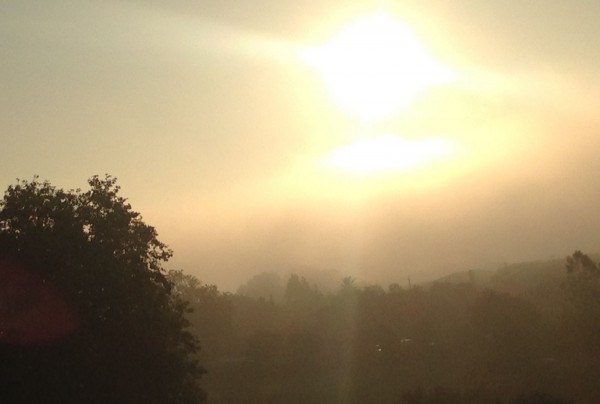
Today Advent begins in the liturgical calendar of the Church: four weeks that are usually described as a time of waiting, a time during which we pause and prepare for the feast of the birth of Jesus.
Someone might ask: Is Advent really necessary? If what’s important is what comes next— Christmas—could we not skip the preamble? Here we would like to emphasize that Advent, this lesser liturgical time (which perhaps does not have the heft of the Christmas season that follows it, or Lent, or Easter) offers an invitation that is especially pertinent for today, one that we would do well to attend. Advent points to the importance of being able to wait, and it would not be an exaggeration to say that we are currently losing the ability to do such a thing, to do it well, and that with this, we are missing the benefits of waiting.
Today we are becoming increasingly unable to wait: we want everything instantly. We live in a world that regards immediacy as an indisputable value. All forms of waiting, therefore, are a nuisance that must be eliminated. We purchase what we need online, so that we do not have to wait to be served at the counter of a store. We download films from digital platforms and watch them in our living room, so as not to have to line up at a theater, wait for everyone to be seated, and for the trailers to finish. We read the news on our phones because it irritates us to wait for the newspapers to arrive at our kiosk or for the time when the television news airs. So as not to waste time waiting for the food to be cooked, we call a delivery service, which in the shortest possible time appears on our doorstep with pizza or whatever we have ordered, hot and ready to be consumed. The so-called "waiting rooms" (the doctor’s, the lawyer’s) are for many people a relic of the past, and when they cannot be avoided, we endure them as if they were real torture chambers! Indeed, we do not find any value in waiting.
And yet, there is something unnatural in our desire to accelerate the results we long for, because many of the essential things in life continue to require, whether we like it or not, patience and the ability to wait. The gestation of a baby in her mother's womb lasts nine months. The ripening of a fruit on the branch of the tree takes weeks. Weaving a friendship can take years, just like studying for a career, learning to master the art of playing an instrument or knowing how to express ourselves in a new language. Savoring a good book may require many hours of slow immersion in its pages, and there are poets who have spent decades retouching and remaking the same poem. It took Michelangelo more than four years to paint the Sistine Chapel, Tolstoy needed five to write War and Peace, the construction of the Taj Mahal lasted 22 years, and 136 years ago they began to build “La Sagrada Familia” church in Barcelona, and it is still unfinished!
It is likely that the modern cult of immediacy is turning us into more efficient people who do more things in less time, but perhaps also more coarse people, because doing things well requires patience, dedication, and a willingness to discover the slow rhythms of nature. And yes, to know how to wait, and even more, to savor the waiting as that which will make us enjoy and value the attainment of what we have hoped for, with patience. Indeed: the great danger of obtaining everything (or almost everything!) in a second by pressing a key on our telephone or computer, is that we can lose the ability to distinguish art from garbage, truth from lies, the deep from the superficial, an authentic love from a passing friendship. Garbage, lies, superficial stuff and passing friendships can be produced in an instant, without effort; on the other hand, art, truth, depth and authentic love cost, they need time to be formed, like the body of a child in the womb of its mother, like a tree that takes decades to grow, like a masterpiece, like trust, like sincerity.
Advent, in short, sends us a warning: "Do not despise the art of waiting." It is an essential warning, and that is why we truly need this season that begins today.
One more year, we embark again in the path of Advent, a path of hope, but above all of joy for the feast that is about to come. Unlike Lent, Advent is not a time of penance, but of preparation for the first great event celebrated by the Church in its annual calendar: the feast of God’s closeness, who lowers himself to embrace the human condition in history, offer his solidarity, and elevate us to his own dignity.
As we would do before any other great event in our lives, we cannot sit down and just wait, doing nothing, to see what happens next. Advent is a time of active preparation, which demands our commitment and requires us to clear any obstacle so that the feast can be celebrated in the best possible conditions. We will hear these days the prophets speak of the need to «fill up the valleys and lower the hills», and thus prepare the ways to the Lord.
«The one who waits, despairs» is the logic of the world, of those who limit themselves to receiving, with resignation, what life can offer them, but without getting involved in the events that happen around them. Christian hope, on the other hand, becomes the impulse to go out to transform the world, so that the advent of God will find us ready and awake, yearning for a better world.
The Community of Saint Paul, small as it is, takes part in the work carried out by the Church throughout the world, to transform the social and even the economic environment as leaven in the flour, making a difference in the fields of human development, education, health, human rights and the dignity of others, especially of those who suffer poverty and exclusion. It is the task to help clear, one by one, the obstacles that separate us from God’s plan for humanity.
With the renewed joy and strength of those who know that a better future is about to come, we intend to continue working to break down walls, build bridges and heal wounds in a world still full of divisions, and invite all our readers and friends to join us in this Advent project, because we are not willing to accept, just like that, the “valleys and hills” of history that surround us.
Martí Colom
We are in Advent! Today, indeed, we celebrate the first of the four Sundays that will take us to the gates of Christmas. And we begin with a reading from the Gospel of Matthew that constitutes a whole program for these coming weeks and, indeed, for the rest of the year. “Keep awake therefore, for you do not know on what day your Lord is coming,” Jesus tells us. And he insists: “You must be ready, for the Son of Man is coming at an unexpected hour.” (Mt 24:42 and 44)
It is pertinent advice. It is surprising, if we stop to think about it, the number of times when we are not awake but asleep, lost in our inner worlds, sometimes preoccupied with small things, sometimes distracted with inconsequential matters. And it is astonishing to be aware of the many times when we are in fact not ready to discover God’s presence among us. We are not prepared, for example, to see the face of Jesus in the people we dislike. We are not prepared to hear his voice in the voice of our adversaries. We are not prepared to catch his eye in the eyes of a sick person who needs our company. We are not prepared to listen to him in the complaints of the most vulnerable around us. We are not prepared to touch his wounds in the wounds of so many people whom social injustice or the contempt of the strongest have neglected. We are not prepared to feel his shadow in the fragility of those who only ask for the opportunity to grow without violence. We are not prepared to attend to his call to act, to defend peace, to defend the need for tenderness, the need for dialogue, which reaches us daily through the events—so often disturbing—that shake the world. We are not prepared to understand that every conflict is an opportunity to give witness to our hope, our faith in others and in the Gospel. We are not always ready to understand that the more the demons of racism, of exclusion of those who think differently, or love differently, or pray differently grow, the more urgent becomes the need for a courageous voice, filled with the spirit of the Gospel, one that is inclusive, compassionate, bold in its tenderness. No, all too often we are not prepared, and that is why we need to hear with all its force today’s announcement: “Stay awake; be ready.”
Advent is a jolt, an invitation to lift up our eyes, to remain attentive to this presence of God in the world—a presence that is both a consolation and a call. This presence gives us peace, and at the same time it invites us to commit ourselves to the reality around us, to the problems of others and to the urgent task of preparing a more just and livable world for all the children who continue to be born, defenseless and fragile, in the forgotten stables and mangers of the earth.
Martí Colom
Today we begin the Advent season, and perhaps a look at the readings of this first Sunday can help us to live in a fruitful way this time of preparation towards Christmas.
We have, first of all, the optimistic and confident voice of Jeremiah: “The days are coming when I will fulfill the promise I made to the house of Israel and Judah … I will raise up for David a just shoot; he shall do what is right and just in the land. In those days Judah shall be safe and Jerusalem shall dwell secure.” On the other hand, Jesus also tells us (in agreement with the prophet) that our “our redemption is at hand.” But his message is much more nuanced, because he utters a disturbing warning before this final promise, filled with apocalyptic echoes: “There will be signs in the sun, the moon, and the stars, and on earth nations will be in dismay … People will die of fright in anticipation of what is coming upon the world.” Jesus is more realistic and restrained than Jeremiah, and perhaps he also wants to be more honest with those who hear him. He tells us: “peace will come and it is true that those who look for justice will not be deceived. But let us make no mistake about it, first there will be trials, conflicts, anguish and suffering.” Advent is not, in other words, a season of low intensity, free of worries, during which we are only asked to adorn our homes with trees, nativity scenes and Christmas decorations while we wait for the night of December 24, listening to carols and pretending that we live in a world without pain. The upcoming birth of the Prince of Peace does not imply the magical disappearance of all violence. In fact, the child is born every year in a wounded world.
Perhaps many will think that in this 2015 the truth contained in Jesus’ words is particularly obvious. Some will listen to the description of “people dying of fright in anticipation of what is coming upon the world” and will say to themselves: “he is talking about us.” The brutal terrorism seen in Paris, Beirut and Egypt in recent weeks, the wars that instead of fading away seem to increase everywhere, the terrible images of endless lines of refugees crossing Europe, the frail boats that daily reach the Greek, Italian or Spanish shores filled with immigrants, the increasing intolerance with which some respond to the suffering of those who arrive… everything seems to strongly confirm the dramatic passage of this Sunday’s Gospel. However, we cannot forget that at the end Jesus echoes Jeremiah and announces without ambiguity the victory of peace and a new dawn of freedom.
What we wished to underline here is that if we are to truly live out Advent in a profound way the season requires that we listen to the completemessage that today Luke places in Jesus’ lips. Then we will have to reject both the fruitless illusion of thinking that we dwell in an idyllic garden without conflicts as well as the hopelessness (just as useless and mistaken) that comes from thinking that tragedy will have the last word.
This, then, requires two things of us, equally important. First, that those who could understand this Season as an invitation to forget about the problems of the larger world and to pretend that they are in a paradise may listen attentively to Jesus’ warning, and may open their eyes to the pain of others. And second, that those who may only heed the announcement of upcoming tragedies may hear also the conclusion of the passage: “when these signs begin to happen, stand erect and raise your heads because your redemption is at hand.”
This age of ours is not different from previous times. As it happens now, every other epoch had those who thought that their world was the culmination of human History, and that they had reached the peak of development and attained the perfect society. They deceived themselves, because they could only maintain such a fiction by ignoring the suffering of their brothers and sisters. In the same way, there were always those who on the other hand believed that their tragedies surpassed the tragedies of previous ages. They would declare that their horror was new, more cruel or overwhelming than the crisis their grandparents had to face –and they concluded that this surely indicated that the final victory of evil over good was a fact. They also deceived themselves, for their pain was not more vicious than the pain of their ancestors (violence is always heartbreaking, whether it takes place today or a thousand years ago, and whether it happens in the streets of France or of Mosul). And they deceived themselves most of all because at the end Jeremiah and Jesus will be right. Advent is the time to wait for He who, indeed, will one day bring peace to all.
How should we, therefore, live out this Advent? By rejecting both the blindness of the naïve and the blindness of the pessimist. This is the task of the person who wants to hear, without fear and with trust, Jesus’ words.



